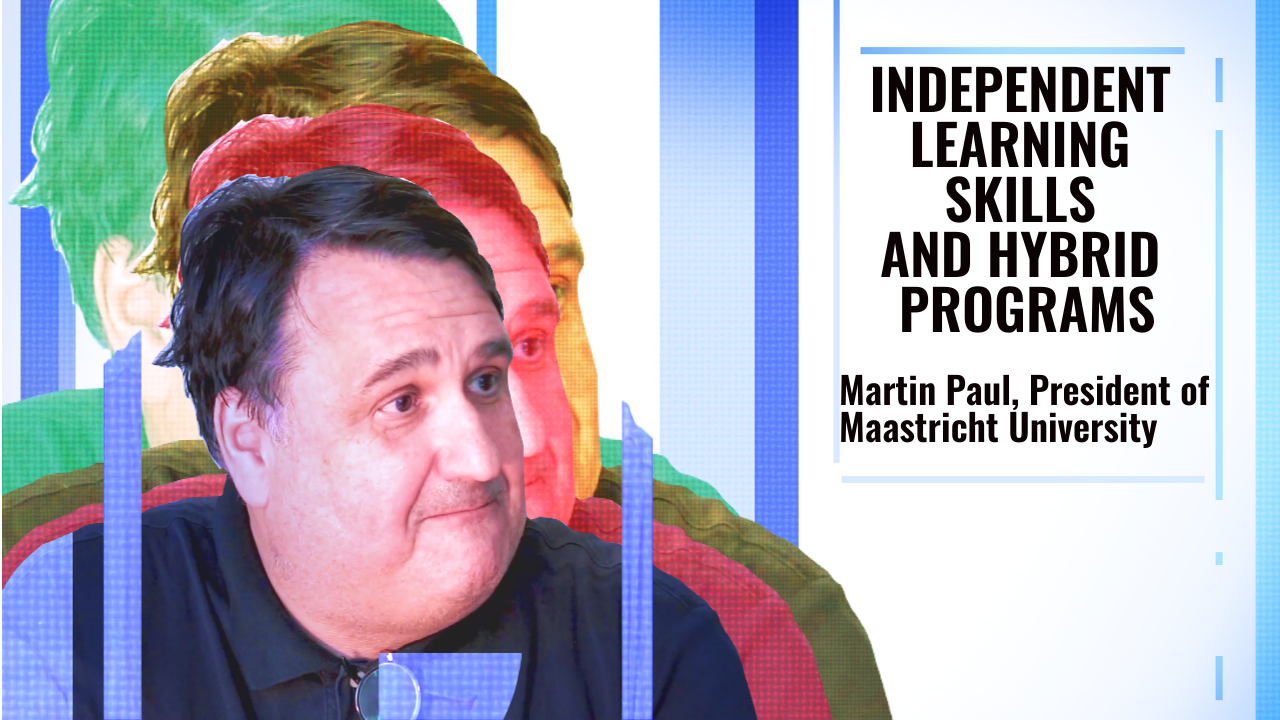In this interview, José Escamilla and Martin Paul, President of Maastricht University, discussed independent learning skills, hybrid educational programs, and the future of higher education.
Transcript
INDEPENDENT LEARNING SKILLS
Martin Paul: After four years of university, we are not there anymore to help the students. I think, from day one, we need to empower the students to be independent learners. They need to learn later in their lives. To keep this on, and I always say, we get these people, they’re 17, 18, 19 years old, they come from schools where they spent 12, 13 years on a bench with somebody was talking in front, these people are very smart, they’re stimulated, they’re intelligent, and now give them the chance to develop as people, as personalities.
HYBRID EDUCATIONAL PROGRAMS
Martin Paul: I think we have to. A few years ago, we created a liberal arts and science college where students and tutors can put together their curriculum. Another thing is that when students today, coming to the university, he or she doesn’t know probably “I want to be a lawyer, I want to be an engineer” and so on., So we give them a choice to also develop hybrid programs. Students think, “I’m interested in philosophy and computer science,” so they can combine these courses. In this liberal arts and sciences program, there are some core courses that everybody has to take, such as history, world history, philosophy of science, ethics, and whatever., Whenever you want to become an engineer or biologist or a business person, you have to take these courses. We see this trend as a program that will have this holistic integration of different areas and things that are important as a citizen active in society.
YOUNG VS. OLD UNIVERSITIES
Martin Paul: I used to work at a very old university, and there is a kind of difference. I used to work at the Charité in Berlin, which is more than 300 years old. If you are in an administrative or management position, you probably can change the course if you push very hard on the wheel, a bit to the left, a bit to the right, and young universities are still growing, they are still ideas, .
So, for us, it is, in my view, it is easier to develop new things. One of the things we develop is, as we know, that engineering and hard sciences are extremely male-dominated. A large percentage of students are male; we started with a kind of liberal arts-oriented science program, where we also give the students flexibility to say: “I want to do something with sciences, but I don’t know if I want to be a material engineering or a mathematician or a computer scientist.” This kind of flexible approach guides students to any discipline.
We have 50% of females in this program. This is something that we can do much easier than in a kind of old-fashioned university. As young universities still, all the staff that comes to us comes not because Maastricht is a beautiful city, which is true, but because they are intrigued about our education philosophy, and that is different, I would say, in institutions that are more established and old in Europe.
RETHINKING THE EUROPEAN UNIVERSITY
Martin Paul: Maastricht is our European city; we need to rethink the European university. The University is a European invention if you say it like that. Everybody talks about the ideas of von Humboldt, I used to work at the Humboldt University in Berlin, and he, of course, made fantastic contributions. Still, I think one; he was developing this idea in a very centralistic state, with very elitist ideas, you know? His idea of the university was the university only for the elite. I think today, where a lot more students go into the university, we have to rethink this concept.
So we were triggered by this call and said, “Let’s put together a group of young universities, one of those universities that are likely more flexible to brainstorm ideas.” We came up with this idea that high education today needs to be accessible, it needs to be inclusive, and we coined the sentence, “we want to be excellent but not elitist.”, That doesn’t mean that everybody should go to university. No, I mean, there’s also a place for schools of applied science and vocational training. Still, everybody who should get access to university should have that possibility based on his or her talent, not on the wealth of their parents or the old- boys’ or old-girls’ network that isn’t very well.
So this is our idea, we are the new kids on the block. We are all universities that are under 50 years old, and we throw this idea to create in a pilot an open space where students can follow courses wherever they are if they want to do it in an integrated way. There were 54 applications admitted for university alliances between five and eight universities, and we got the highest score of all. We got 97 out of 100 points. We never got such a high score in a grade, because we triggered something in Europe. that we say: “let’s rethink education from educational spirit, from the quality and from many things of the ideas that we have in Maastricht, the next education, we also need to provide active citizens for society.”
That’s what we’re doing with this network alliance. The design that we want to have in courses that you can begin your course in Rome, do the next block in Madrid and then follow it up on Cyprus, and of course, you can do it across universities. It’s a private program, but you know, we designed some themes, one is, of course, Europe, the future of Europe, everything, that course is about Europe, the digital society. These are courses that are present in all of these universities, sustainability, and citizenship. We designed some topics in the beginning, to see how this open course can work, and then we evaluate it after three years. It’s a pilot, and the idea is that if positive evaluation, then a number of universities alliances can also get what we call a European statute, that you’re not only a national university but also have a European label.
CITIZENS OF THE FUTURE
Martin Paul: I think, number one, you have to have a sort of cultural understanding, an understanding that people are different, have different backgrounds, different needs, and in all international classrooms that we employ, we must switch to an AIUF network, we try to create that atmosphere.
Number two, we need to get rid of the idea of inequality, which is very difficult in the long-term process. But if you give our students the tools, for example, of global citizenship education where we train them in certain, not only knowledge about these facts but also about, again, the skills that you need to address this, then you have, probably, made a good contribution.
A lot of our graduates are working in NGO’s and are active in their studies in this area. So, it’s a long-term process, but in the end, I think the solution to populism and nationalism is knowledge, it is providing education, getting smart people, getting a generation back that’s not depending on tweets as a knowledge base. (OFF: Yes, Yes) So it’s a long-term project but, we call this, you know
, the Maastricht generation, not, they’re not students from Maastricht, these are students who were born after 1992, they’ve never seen Europe dissolve borders., to them Europe means something else than to the fifty-plus people who voted for BREXIT largely. We need to build up this new knowledge base, and we need to do it bottom-up, and we need to have, of course, it’s a long-term perspective, you can’t resolve this tomorrow, but you have to put something, an alternative, on the ground too; an alternative to nationalism and populism based on knowledge, based on understanding, and cultural skills.
THE FUTURE OF HIGHER EDUCATION
Martin Paul: It’s very hard to predict the future, but I think that higher education will have a lot more variety both for the universities but also for the students. We’re still living in a campus-based system, the students go to the universities, its one-to-one contact. I think given the fact of technological innovations, students that are extremely skilled and techniques that the teachers are not, and the possibility to choose your own or modify your course. I think it will have a more holistic way of approaching this; it will be a lot more right. It will be a mix of technology and classic campus-based orientation. It will probably be something where educational models will not be put into a four-year-old or three-year-old context, but will also probably be spread more towards life.
What will be the value of a degree? I think universities, and I think you need to adapt to this, need to be developed into academic communities where all these different aspects can flourish. It will be a much more complex task to organize universities than it is now. It is still of a one-size kind of system, so we will have more variety.
This article from Observatory of the Institute for the Future of Education may be shared under the terms of the license CC BY-NC-SA 4.0 
)
)


)